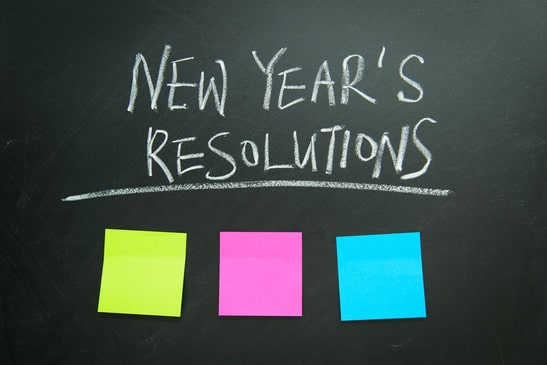Even though the holiday season is just getting underway, it’s not too early to begin making New Year’s resolutions. That’s because setting effective nutrition and exercise goals is a process that takes time and careful consideration. Sometimes when resolutions fall short, it’s not due to a lack of determination, but a failure to identify the real problem and, therefore, an appropriate solution.
Here are some examples of resolutions that miss the mark along with my analysis of what should be done instead:
“My boyfriend and I have put on a lot of weight because we’re eating too many carbs, so our New Year’s resolution is to cut out beer, pasta, potatoes, and bread. Instead of drinking a few beers every day, I’m going to have three glasses of wine and my boyfriend is going to drink four vodka tonics.”
Analysis: Eating too many carbs is not the main problem here. This couple is consuming excessive calories from all sources and drinking too much. Alcohol has 7 calories per gram, almost as much as fat at 9 calories per gram. Also, too much alcohol can damage your liver and blood vessels.
Better New Year’s resolutions: Follow the USDA’s MyPlate recommendations in meal planning. Also, limit drinking to no more than 1 drink per day for women and no more than 2 drinks a day for men.
“I’m looking to get bigger muscles, so my New Year’s resolution is to take protein supplements and drink protein shakes after I work out.”
Analysis: Muscles grow larger by being used, not because you’re eating extra protein. Overeating from any source, including protein, can lead to overweight/obesity. Also, too much protein can damage your kidneys.
Better New Year’s resolutions: Enlist the help of a registered dietitian nutritionist to work out a well-balanced eating plan. Also, find a qualified personal trainer who can oversee a weight training and aerobic exercise program.
“I’ve been working with a personal trainer to shed the last of the baby weight. She says I need to ‘eat clean,’ so my New Year’s resolution is to avoid fructose, gluten, and dairy. I know she’s right because I’ve read it on the internet.”
Analysis: Personal trainers — unless they have a degree in nutrition — are not qualified to give dietary recommendations. Also, in many states, it’s illegal for an unlicensed person to give nutrition advice. As for the internet: there are great resources online, but there’s also an abundance of misinformation. Fructose is an excellent example. Social media often unfairly blame it for the obesity epidemic or for causing increased appetite even though there are no well-conducted scientific studies supporting those claims.
Better New Year’s resolution: Get your nutrition information from reputable sources and then stick to their advice. A meeting with a registered dietitian nutritionist is an excellent first step. The USDA’s SuperTracker site can also be a good place to start. There, you can enter the foods and beverages you consume each day and the site will give you a personal plan that shows your daily food group targets including what and how many servings to eat within your calorie allowance.
What will your 2017 resolutions be?
 Ellen Stokes, MS, RD, LD is an award-winning video producer, director, and writer in addition to being a registered dietitian. Ellen writes and creates videos about nutrition education, food safety, menu planning, grocery shopping, and healthful cooking on a budget. Ellen has worked with organizations and companies including WebMD, the Partnership for Food Safety Education, and the University of Georgia Food Science Department. Ellen formerly worked for CNN as a writer and producer and teaches food safety and nutrition for Georgia State University. Check her out on Twitter @EllenS_RD.
Ellen Stokes, MS, RD, LD is an award-winning video producer, director, and writer in addition to being a registered dietitian. Ellen writes and creates videos about nutrition education, food safety, menu planning, grocery shopping, and healthful cooking on a budget. Ellen has worked with organizations and companies including WebMD, the Partnership for Food Safety Education, and the University of Georgia Food Science Department. Ellen formerly worked for CNN as a writer and producer and teaches food safety and nutrition for Georgia State University. Check her out on Twitter @EllenS_RD.

